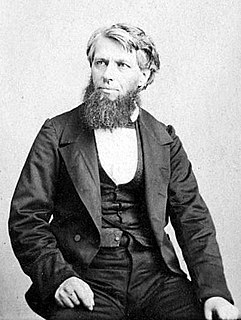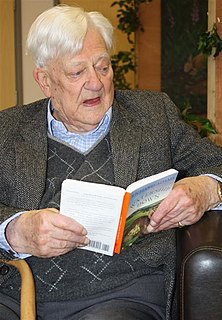A Quote by William Penn
A jealous man only sees his own spectrum when he looks upon other men, and gives his character in theirs.
Related Quotes
When the father dies, he writes, the son becomes his own father and his own son. He looks at is son and sees himself in the face of the boy. He imagines what the boy sees when he looks at him and finds himself becoming his own father. Inexplicably, he is moved by this. It is not just the sight of the boy that moves him, not even the thought of standing inside his father, but what he sees in the boy of his own vanished past. It is a nostalgia for his own life that he feels, perhaps, a memory of his own boyhood as a son to his father.
It is alleged by men of loose principles , or defective views of the subject, that religion and morality are not necessary or important qualifications for political station. When a citizen gives his vote to a man of immorality , he abuses his civic responsibilty. He sacrifices not only his own interest but that of his neighbor, and he betrays the interest of his country.
When a jealous person sees signs of other people's success and good fortune, his heart is pierced with envy. But someone who has learned to rejoice in the good fortune of others experiences only happiness. Seeing another person's beautiful house or attractive partner immediately makes him happy - the fact that they are not his own is irrelevant.
Man is the only Patriot. He sets himself apart in his own country, under his own flag, and sneers at the other nations, and keeps multitudinous uniformed assassins on hand at heavy expense to grab slices of other people's countries, and keep them from grabbing slices of his. And in the intervals between campaigns he washes the blood off his hands and works for the universal brotherhood of man - with his mouth.
There is a fundamental moral difference between a man who sees his self-interest in production and a man who sees it in robbery. The evil of a robber does not lie in the fact that he pursues his own interests, but in what he regards as to his own interest; not in the fact that he pursues his values, but in what he chose to value; not in the fact that he wants to live, but in the fact that he wants to live on a subhuman level.
No man could bring himself to reveal his true character, and, above all, his true limitations as a citizen and a Christian, his true meannesses, his true imbecilities, to his friends, or even to his wife. Honest autobiography is therefore a contradiction in terms: the moment a man considers himself, even in petto, he tries to gild and fresco himself. Thus a man's wife, however realistic her view of him, always flatters him in the end, for the worst she sees in him is appreciably better, by the time she sees it, than what is actually there.
Returning from the wilderness a man becomes a restorer of order, a preserver. He sees the truth, recognizes his true heir, honors his forbears and his heritage, and gives his blessing to his successors. He embodies the passing of human time, living and dying within the human limits of grief and joy.
When the man was disgraced and told to go away, he was allowed to ask all the animals whether any of them would come with him and share his fortunes and his life. There were only two who agreed to come entirely of their own accord, and they were the dog and the cat. And ever since then, those two have been jealous of each other, and each is for ever trying to make man choose which one he likes best. Every man prefers one or the other.
But what will he do when he sees only too clearly why his patient is ill; when he sees that it arises from his having no love, but only sexuality; no faith, because he is afraid to grope in the dark; no hope, because he is disillusioned by the world and by life; and no understanding, because he has failed to read the meaning of his own existence?








































